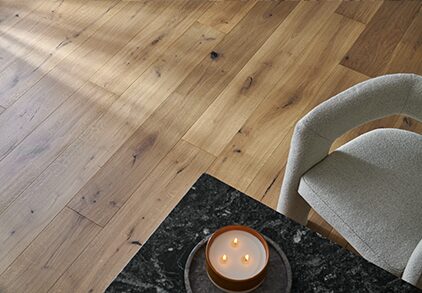
Dartmouth Beaten Oak
A perfect blend of raw authnticity and refined craftmanship, this pale, hand-scraped oak reveals the wood's natural character, evoking the quiet beauty of freshly hewn timber.
Engineered Wood | UV Oiled


Engineered Wood | UV Oiled
291 in stock
SKU: 75-DBE-190
£93 per m² £201.44 per pack (2.166m2 per pack)
291 in stock
Compare
A perfect blend of raw authnticity and refined craftmanship, this pale, hand-scraped oak reveals the wood's natural character, evoking the quiet beauty of freshly hewn timber.
| Pack Size | 2.166m² |
|---|---|
| Bevels on Edges | All 4 edges |
| Core Material | Plywood |
| Finish | UV Oiled |
| Fitting Method | Floated, Glued, Nailed |
| Floor Colour | Light, Natural |
| Floor Features | Hand-scraped, Visible Saw Marks |
| Floor Grade | Extra Rustic |
| Floor Joint | Tongue & Groove |
| Floor Thickness | 15mm |
| Floor Type | Real Wood Engineered |
| Hardness | Hard |
| Length | 1900mm |
| Planks per Pack | 6 |
| Species | Oak |
| Tog Rating | 1.15 |
| Underfloor Heating | Suitable if Glued Down |
| Width | 190mm |
These are the questions we get asked most often about our floors and their features.
Yes – We recommend you let your Dartmouth floor acclimatise for 3 to 4 days before installing. This needs to be in the same room that it will be installed in, and it needs to remain within the sealed packaging. The sealed packaging helps ensure the floor doesn’t warp with the change of temperature from different environments. Do not store the flooring outdoors, in an outbuilding, or anywhere with damp or condensation problems.
The surface immediately beneath a Woodpecker natural wood floor must be in good structural condition, free from damp rot, fungal or insect infestation, and contaminating residues. It must be flat with uneven areas not exceeding 3mm over a 2m area. Naturally, the surface should be vacuumed and totally free of debris before fitting begins. Hot pipes should be well insulated to prevent localised hotspots, which can cause wood flooring to warp or shrink.
Dartmouth flooring is 15mm thick.
Dartmouth has tongue and groove joints.
We generally wouldn’t recommend using engineered flooring in a bathroom.
This means that at least one plank within your pack will be cut in half. This is intentional as it will help spread the joints out across your floor, thus helping prevent weakening. The other planks will be the same length.
Yes – Dartmouth is suitable for underfloor heating but only if it is fully stuck down.
We generally recommend 10% wastage, however, this can be impacted by the room shape, laying style and other factors so always check with your installer first.
Dartmouth flooring can either be floated, secret nailed or glued.
As wood is a natural substance, it will expand and contract with changes in temperature and humidity. That’s why when a wood floor is fitted, expansion gaps need to be left wherever the boards meet a wall, structural support, stairs, breakfast bar, fireplace, central heating pipe…etc. Gaps must also be considered at doorways to allow for the differing expansion between rooms. Place spacers at regular intervals when fitting and then remove them before skirting boards, beading or trims are put in place. Allow a 2mm gap for every metre span of the floor with a minimum of 10-15mm gap regardless. For areas over 5m in width, extra provisions should be made for expansion.
To clean this Dartmouth oiled floor, simply use our specially formulated cleaning liquid for oiled floors. Alternatively, use a well-wrung mop (water only). We do not recommend using a steam mop or any other solutions on our floors.
Colour variation is the natural beauty and variations in colour that occur in real wood. To ensure the overall effect has a good balance of colour and details, take care to blend planks from several packs across the entire room.
In this blog we discuss a frequently asked question – engineered wood vs solid wood flooring – which is better? Including which is more stable, durable and which looks better.
Read BlogEverything you need to know about engineered flooring, including; what is engineered wood flooring, the different types, what rooms it can be used in, how long it lasts, how to lay engineered floors, and how to care for the floor once it’s installed.
Read BlogThe construction of engineered flooring makes it a practical choice for modern spaces. Learn how its made with this handy guide…
Read BlogEngineered flooring has all of the natural beauty of solid wood but it’s manufactured in a way that makes it more versatile and more practical within a modern space…
Read BlogWhen the time comes to update a floor, most people are drawn to solid wood. So when we say that ‘engineered wood flooring’ has a whole array of benefits you might not have considered, an eyebrow or two is often raised in suspicion…
Read BlogEach type of wood species offers a slightly different look, giving you the chance to choose from a variety of naturally beautiful styles. Get to know what makes each species unique in our simple guide.
Read BlogSelect at least 2 products
to compare